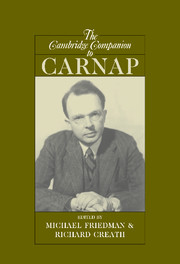Book contents
- Frontmatter
- Introduction: Carnap’s revolution in philosophy
- 1 Carnap’s intellectual development
- 2 Geometrical leitmotifs in Carnap’s early philosophy
- 3 Carnap and Frege
- 4 Carnap and Husserl
- 5 Carnap, Russell, and the external world
- 6 The Aufbau and the rejection of metaphysics
- 7 Carnap and the Vienna Circle: rational reconstructionism refined
- 8 Carnap and modern logic
- 9 Tolerance and logicism: logical syntax and the philosophy of mathematics
- 10 Carnap’s quest for analyticity: the Studies in Semantics
- 11 Carnap on the rational reconstruction of scientific theories
- 12 Carnap on probability and induction
- 13 Carnapian pragmatism
- 14 Quine’s challenge to Carnap
- Bibliography
- Index
3 - Carnap and Frege
Published online by Cambridge University Press: 28 April 2008
- Frontmatter
- Introduction: Carnap’s revolution in philosophy
- 1 Carnap’s intellectual development
- 2 Geometrical leitmotifs in Carnap’s early philosophy
- 3 Carnap and Frege
- 4 Carnap and Husserl
- 5 Carnap, Russell, and the external world
- 6 The Aufbau and the rejection of metaphysics
- 7 Carnap and the Vienna Circle: rational reconstructionism refined
- 8 Carnap and modern logic
- 9 Tolerance and logicism: logical syntax and the philosophy of mathematics
- 10 Carnap’s quest for analyticity: the Studies in Semantics
- 11 Carnap on the rational reconstruction of scientific theories
- 12 Carnap on probability and induction
- 13 Carnapian pragmatism
- 14 Quine’s challenge to Carnap
- Bibliography
- Index
Summary
Rudolf Carnap is, along with Frege, Russell, and Wittgenstein, one of the outstanding representatives of analytic philosophy - indeed, its most radical, as shown by his attempt to reduce philosophy to the logic of science, thereby seeking to establish philosophy itself as a science. But if we want to understand Carnap, we have to examine the historical situation in which his thought developed. The founders of a new tradition often remain indebted to the tradition they seek to break with. Unlike those who come after them, they are conscious of their opposition to the older tradition, and even when it does not surface as a central theme, their ideas at least bear indirect witness to it. This is certainly true of Carnap, an analytic philosopher whose ideas are deeply rooted in continental European soil, drawing nourishment not only from the “dry” soil of science, but also from Carnap's “rich” experience as an active member of the German Youth Movement. After leaving Europe, Carnap more or less abandoned those roots for political reasons. But in his “Intellectual Autobiography,” he does vouchsafe a few clues about early influences on his intellectual development during his student years and immediately thereafter (Carnap, 1963a, 3-13).
- Type
- Chapter
- Information
- The Cambridge Companion to Carnap , pp. 65 - 80Publisher: Cambridge University PressPrint publication year: 2007
- 5
- Cited by

